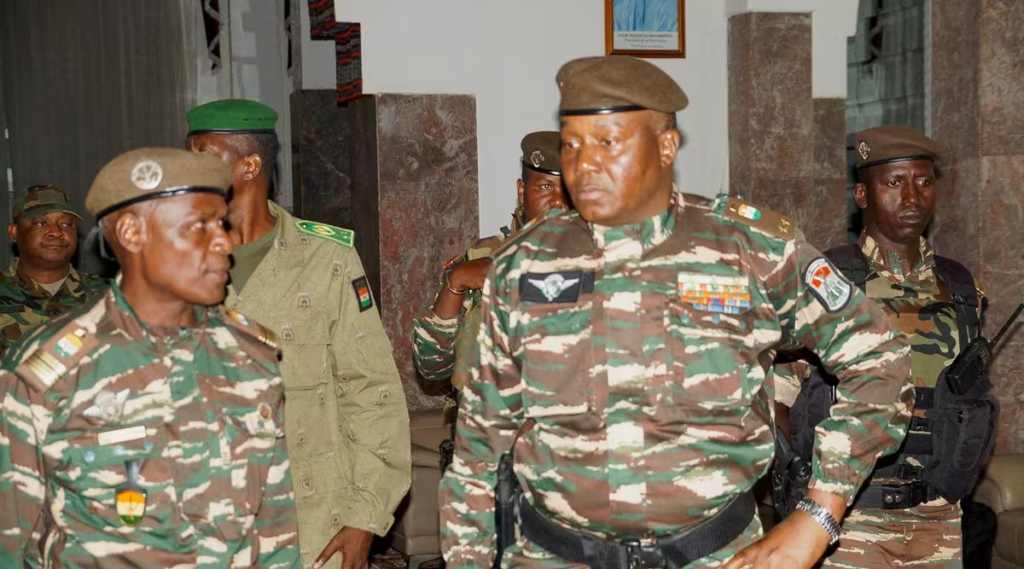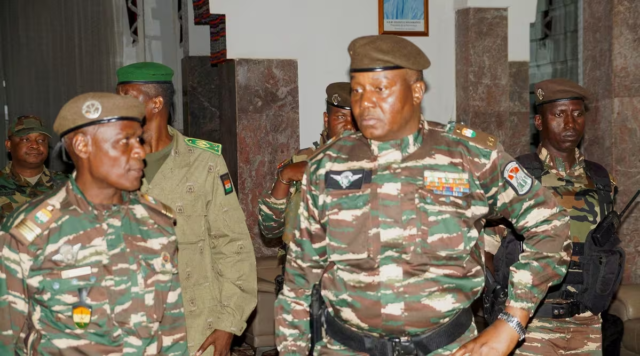
- New movement aims to reinstate ousted President Bazoum
- Launch comes just before regional summit on Niger
- Junta has rebuffed diplomatic envoys
- Army rulers of Mali, Burkina Faso strongly support junta
A former rebel leader and politician in Niger has launched a movement opposing the junta that took power in a July 26 coup, a first sign of internal resistance to army rule in the strategically important Sahel country.
Rhissa Ag Boula said in a statement seen on Wednesday that his new Council of Resistance for the Republic (CRR) aimed to reinstate ousted President Mohamed Bazoum, who has been in detention at his residence since the takeover.
“Niger is the victim of a tragedy orchestrated by people charged with protecting it,” the statement said, adding that the CRR would use “any means necessary” to stop the military from denying the people of Niger their free choice.
The challenge from Ag Boula raises the spectre of internal conflict in Niger, a major uranium producer that hosts thousands of U.S. and Western European troops as part of international efforts to contain Islamist insurgents in the Sahel.
The junta has so far rebuffed diplomatic overtures from African, U.S. and U.N. envoys, while its allies, the army rulers of neighbouring Mali and Burkina Faso, have called on the United Nations and African Union to prevent any military intervention.
On Thursday, heads of state from the Economic Community of West African States (ECOWAS) are scheduled to meet in the Nigerian capital Abuja to discuss Niger, including the possible use of force to restore constitutional order.
The CRR supports ECOWAS and any other international actors seeking to end army rule in Niger, according to Ag Boula’s statement, which added that it would make itself available to the bloc for any useful purpose.
A CRR member said several Nigerien political figures had joined the group but could not make their allegiance public for safety reasons.
Ag Boula played a leading role in uprisings by Tuaregs, a nomadic ethnic group present in Niger’s desert north, in the 1990s and 2000s. Like many former rebels, he was integrated into government under Bazoum and his predecessor Mahamadou Issoufou.
While the extent of support for the CRR is unclear, Ag Boula’s statement could worry the coup leaders given his influence among Tuaregs, who control commerce and politics in much of the vast north. Support from Tuaregs would be key to securing the junta’s control beyond the city limits of the capital Niamey.
The U.N., Western powers and democratic ECOWAS member states such as Nigeria want the junta to reinstate a civilian government that had been relatively successful in containing the Islamist insurgents devastating the Sahel.
Niger is the world’s seventh-largest producer of uranium, the most widely used fuel for nuclear energy. It also extracts 20,000 barrels per day of oil, mostly from Chinese-run projects, and is on the threshold of a major surge in production via a new export pipeline to Benin.
COMPLEX DIPLOMATIC PICTURE
Mali and Burkina Faso, ECOWAS members that have rejected Western allies since their own juntas took power in coups in the past two years, have vowed to defend Niger’s new army rulers from any forceful attempt to remove them.
In a letter to the U.N., they called on the Security Council to prevent any armed action against Niger, saying it would have unpredictable consequences such as the break-up of ECOWAS, a humanitarian disaster and a worsening security situation.
The coup has already led to border and airspace closures that have cut off supplies of medicine and food, hampering humanitarian aid in one of the world’s poorest countries.
“The first thing we expect from them (the junta) is security and equitable management of resources. And our raw materials must be sold at their fair value, to be reinjected into basic social sectors such as education and health,” said Issifou Noga, a taxi driver in Niamey.
U.S. Secretary of State Antony Blinken said late on Tuesday that he had spoken to Bazoum to express continued efforts to find a peaceful resolution to the crisis.
“The United States reiterates our call for the immediate release of him and his family,” he posted on the social media platform X, formerly known as Twitter.
Nigeria’s President and ECOWAS chairman Bola Tinubu imposed more sanctions on Niger on Tuesday, aimed at squeezing entities and individuals involved in the takeover, and said all options were still on the table.
ECOWAS has said that the use of force would be a last resort. The bloc’s defence chiefs have agreed on a possible military action plan, which heads of state will discuss at their summit on Thursday.
Further complicating the diplomatic picture is the influence of Russia in the Sahel region, which Western powers fear could grow stronger if the junta in Niger follows Mali’s example by throwing out Western troops and inviting in mercenaries from Russia’s Wagner private army.
Niger now hosts U.S., French, German and Italian troops under agreements made with the now deposed civilian government.






